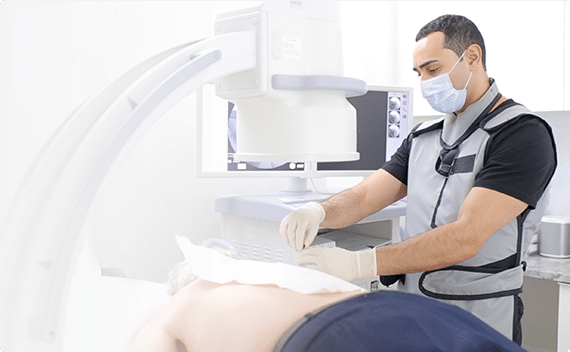Sciatica Pain Doctor in West Orange Talks Sciatica Does and Don’ts
February 01, 2021
Sciatica is a condition estimated to affect about 40% of the world population at least once in their lifetime. This means all of us are running the risk of developing sciatica pain at some point, and as we age, this risk increases.
What causes sciatica pain is the irritation or compression of the sciatic nerve. This nerve stretches all the way from the lower spine to the hips and legs, making it the largest one in the human body. When the sciatic nerve is irritated, it leads to a distinct type of pain that originates in the lower back and can be felt anywhere throughout the sciatic nerve, including the hips and legs. Sometimes, the pain is accompanied by numbness or a pins and needles sensation in the lower limbs.

Contrary to what some people believe, sciatica is not a medical condition, but in fact, a symptom that can be caused by multiple underlying conditions. If you are experiencing sciatica pain, it is recommended you contact a pain physician and seek medical advice as soon as possible to identify what is causing pressure to the sciatic nerve.
Are you searching for a sciatica pain doctor in West Orange? Then look no further than Pain Treatment Specialists, where our Harvard-trained physicians are ready to help you rediscover how it is to live your life without pain. And because we want to educate our patients about their pain, our doctors are here today to explore what you should and should not do when dealing with sciatica pain.

1. DO: Get informed about the methods of treatment
Sciatica pain can be treated in various ways, but to find accurate treatment, your doctor needs to determine what is causing the pain. In most cases, sciatica pain happens due to a herniated or slipped disk, but there can be a variety of other reasons associated with it. This includes injuries to the spine or sciatic nerve, spinal stenosis, and degenerative disk disease.
Once the reason for your sciatic pain has been determined, you can discuss the appropriate types of treatment with your doctor.
Common treatment options are:
- Prescribed medicine: if over-the-counter medicine does not seem to alleviate the pain, your doctor will prescribe stronger muscle relaxants and anti-inflammatory medicine.
- Minimally invasive treatment: this includes minimally invasive procedures such as steroid injections to alleviate pain.
- Physical therapy: your doctor can also recommend physical therapy to help your body get back into shape and make the recovery process easier.
- Surgery: if all other methods of treatment fail, the doctor may recommend surgery to eliminate the cause of pain
2. DON’T: Assume it will go out on its own
Sciatica pain can be different from patient to patient. You may have heard some people get rid of sciatic pain with some over-the-counter medicine, while others need extensive surgery to remove the root cause of the pain. This happens because sciatica pain can have a myriad of reasons and, depending on these reasons, the pain can rise or decrease in intensity.
While acute sciatica pain does typically go by with the use of some painkillers, there is no guarantee the pain won’t come back. The best thing you can do if you feel sciatic pain is bothering you is to contact a pain physician and go in for an examination. The doctor will determine what is putting pressure on your sciatic nerve and what you can do to make the pain go away.
3. DO: Develop a good sleep hygiene
Whether we like to believe it or not, a lot of the poor habits we develop throughout our lives can negatively affect our health. The way you sleep can have an impact on your sciatica pain, so it is important to ask your doctor what you can do to develop good sleeping hygiene.
There are certain rules you need to follow to ensure you get a good night’s rest and your back won’t have to suffer in the process. Some of these rules are:
- If you have sciatica pain, don’t sleep on a soft mattress. Firm surfaces are the ones that can help alleviate the pain.
- Avoid caffeine before going to bed so that you don’t toss and turn all night, putting pressure on your back.
- Sleeping with your knees elevated can relieve pain. Try sleeping on your back with one or more pillows under your knees. If you like to sleep on your side, place the pillow between your knees to reduce pressure on your lower back.
4. DON’T: Sit at your desk all day long
While sciatica pain can bother anyone at any point in their lives, studies have shown those who lead a sedentary life are more exposed to the risks. Through the nature of our jobs, many of us need to sit for several hours a day, putting pressure on the back and increasing the risk of developing sciatic pain.
Fortunately, there are things you can do to avoid this, including using special gear that can make working at your desk less harmful. Consider investing in a leaning chair that can help you maintain a good posture, as well as a standing desk so that you can alternate standing up or sitting down when working.
5. DO: Contact a pain physician
If the underlying condition is not treated in time, sciatica pain can become excruciating. If you feel a type of low back pain that radiates towards the legs and feet and does not seem to go away with over the counter medicine, it is time you contact a sciatica doctor as soon as possible.
Only a trained physician can determine what is causing your sciatic nerve to get irritated and prescribe the correct type of treatment. Determining the root cause of your pain as soon as possible increases the chances of successfully using minimally invasive procedures to cure your pain.
If you are looking for a sciatica pain doctor in West Orange, don’t hesitate to book an appointment, pay a visit to our West Orange, NJ clinic, and explore your treatment options today! Come and visit us at our West Orange, NJ Pain Center near the Essex Country Club and get a correct diagnosis and a personalized recovery plan based on your needs, or submit an online form.
Book a Consultation
Scheduling a consultation with one of our pain treatment specialists is one of the best ways to determine the proper solution for pain relief.
Meet Our Team of Back Pain Specialists
All of our Pain Doctors in New Jersey are Harvard Trained and Board Certified in Pain Management

Back Pain Doctor Clifton & West Orange NJ
Dr. George Hanna
Dr. Hanna is a Harvard Trained back specialist in New Jersey and New York. He serves as Medical Director of Pain Management.

Back Pain Doctor Clifton & West Orange NJ
Dr. Laura Lombardi
Dr. Lombardi is a Harvard Trained back pain treatment doctor, currently seeing patients in Clifton and West Orange, New Jersey.

Back Pain Doctor Clifton & West Orange NJ
Dr. Shane Volney
Dr. Volney is a Harvard Trained back treatment doctor seeing patients in the NJ areas of Clifton & West Orange, and in NYC.

Back Pain Doctor Clifton & West Orange NJ
Dr. Michael Nguyen
Dr. Nguyen is Harvard Trained and Board Certified in Pain Management. His pain center accepts major medical insurances and Medicare.

Dr. George Hanna

Dr. Laura Lombardi
Dr. Lombardi is a Harvard Trained back pain treatment doctor, currently seeing patients in Clifton and West Orange, and Paramus New Jersey.

Dr. Shane Volney
Dr. Volney is a Harvard Trained back treatment doctor seeing patients in the NJ areas of Clifton & West Orange, and in NYC.

Dr. Michael Nguyen
Dr. Nguyen is Harvard Trained and Board Certified in Pain Management. His pain center accepts major medical insurances and Medicare.
